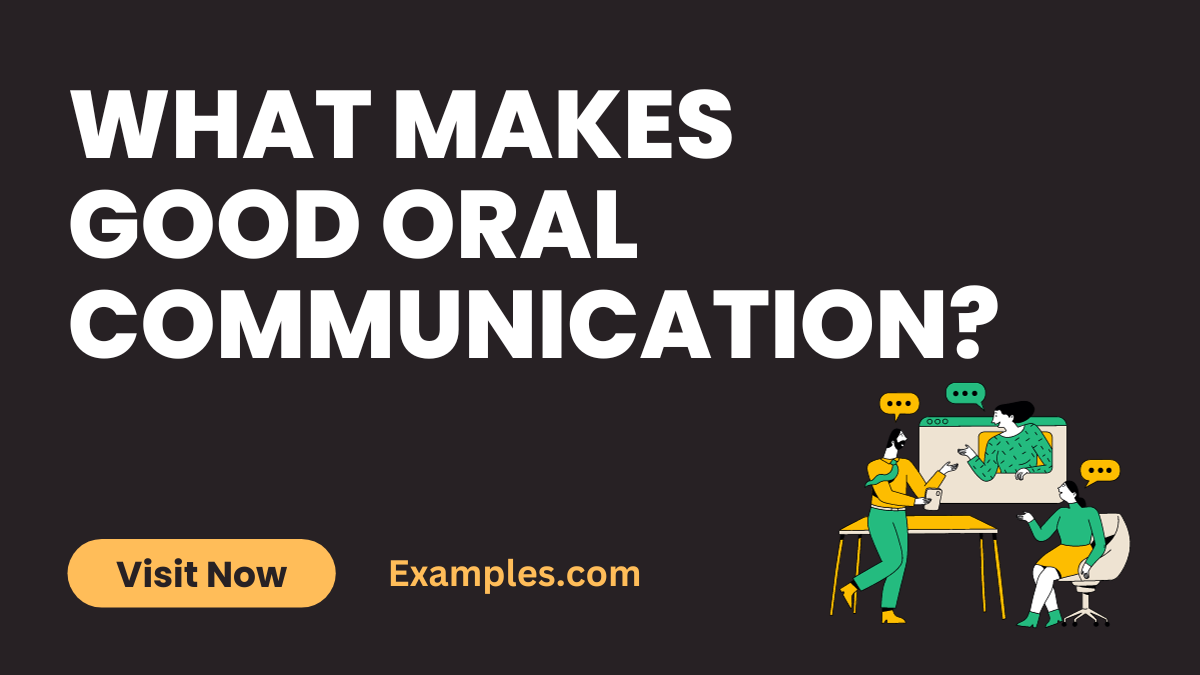What Makes Good Oral Communication?
Unlock the art of effective communication with our comprehensive guide on “What Makes Good Oral Communication.” This resource not only delves into the key components and characteristics but also provides illuminating communication examples to solidify your understanding. Elevate your skills, explore insightful tips, and navigate through practical examples that showcase the essence of impactful oral communication. Whether for personal growth or professional advancement, this guide is your gateway to mastering communication examples and fostering meaningful connections.
What Makes Good Oral Communication?
Good oral communication refers to the effective transmission and reception of messages through spoken language. It involves clear articulation, active listening, appropriate tone, and the ability to convey ideas concisely and comprehensively. This form of communication aims to facilitate understanding, establish rapport, and exchange information in various settings, fostering meaningful connections and relationships.
How to Demonstrate Oral and Written Communication on Your Resume?
In a competitive job market, showcasing strong oral and written communication skills on your resume is crucial for catching the attention of potential employers. Here’s a comprehensive guide on effectively highlighting these skills:
1. Craft a Powerful Professional Summary: Begin your resume with a compelling professional summary that succinctly outlines your expertise in oral and written communication. Use action verbs and quantify your achievements when possible.
2. Tailor Your Work Experience Section: Focus on relevant experiences that highlight your communication skills. Use bullet points to emphasize accomplishments that demonstrate effective verbal and written communication in past roles.
3. Highlight Key Achievements: Create a separate section to showcase key achievements related to communication. Include successful presentations, impactful written documents, or instances where your communication led to positive outcomes.
4. Utilize a Skills Section: Incorporate a dedicated skills section to explicitly list your oral and written communication skills. Include specific software or tools you’re proficient in, such as Microsoft Office or project management platforms.
5. Showcase Certifications and Training: If you’ve undergone specific training or earned certifications in communication-related areas, highlight them prominently. This could include public speaking courses, writing workshops, or industry-specific communication training.
6. Provide Specific Examples: Where applicable, use quantifiable examples to illustrate your communication prowess. Mention successful collaborations, effective client interactions, or instances where your writing contributed to project success.
7. Tailor Your Resume for Each Job: Customize your resume for each job application by emphasizing the aspects of communication most relevant to the specific role. Use keywords from the job description to align your skills with the employer’s needs.
8. Include a Well-Crafted Cover Letter: Your cover letter offers an additional opportunity to showcase your written communication skills. Craft a compelling letter that not only introduces you but also provides insights into your personality and communication style.
9. Request Endorsements on LinkedIn: Strengthen your online presence by securing endorsements on LinkedIn. Ask colleagues, supervisors, or clients to endorse your oral and written communication skills, adding credibility to your resume.
10. Be Prepared to Demonstrate: During interviews, be ready to demonstrate your communication skills. Practice articulating your thoughts clearly and concisely, and prepare examples that highlight your effectiveness in both written and oral communication.
Why is Oral Communication Important in Learning?
Effective oral communication plays a pivotal role in the learning process, influencing academic success and personal development. Here are key aspects highlighting its significance:
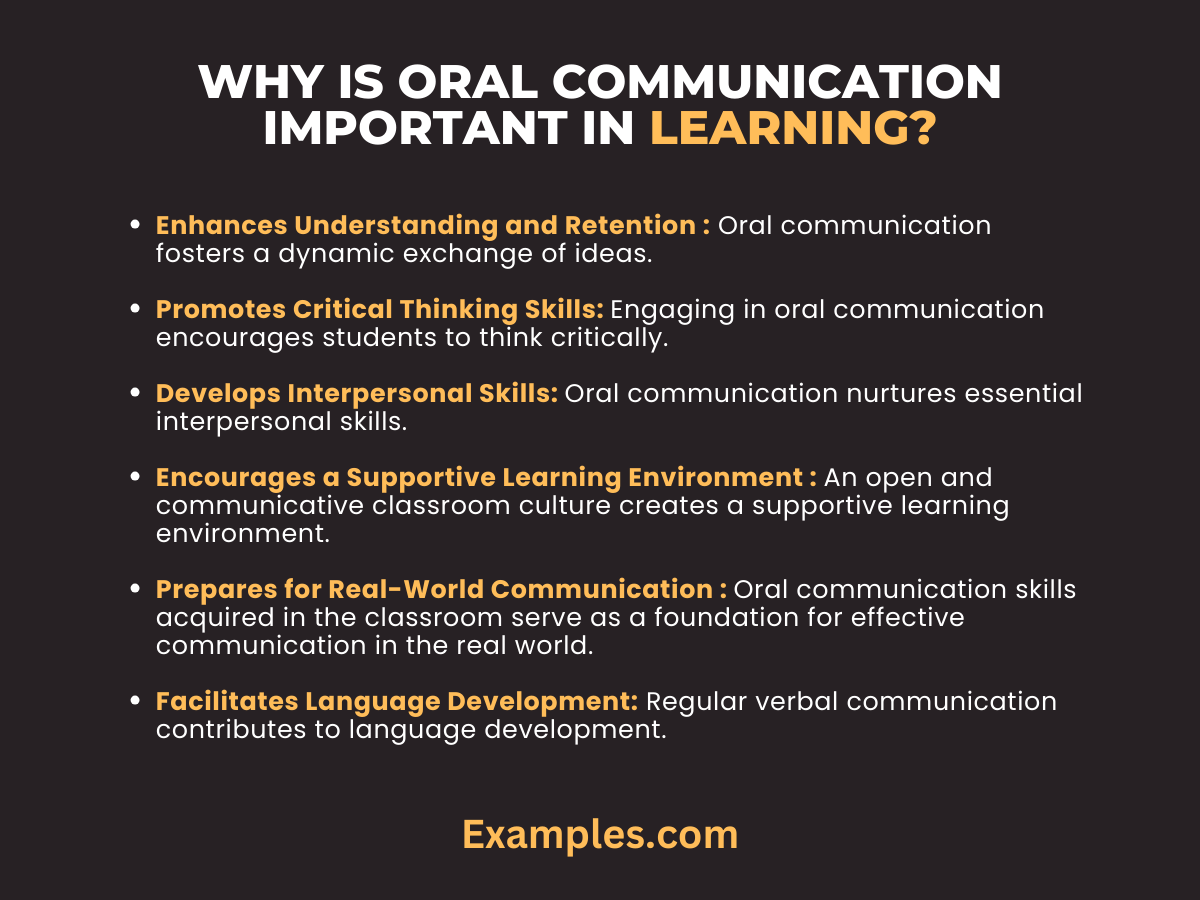
Enhances Understanding and Retention : Oral communication fosters a dynamic exchange of ideas. Through discussions, students can gain different perspectives, clarify doubts, and deepen their understanding of complex concepts. The interactive nature of verbal communication promotes active engagement, leading to better information retention.
Promotes Critical Thinking Skills: Engaging in oral communication encourages students to think critically. Expressing thoughts verbally requires them to organize ideas coherently, analyze information, and articulate arguments. This process sharpens cognitive skills, fostering a deeper comprehension of subjects and the ability to approach challenges with a critical mindset.
Develops Interpersonal Skills: Oral communication nurtures essential interpersonal skills. Students learn how to express themselves clearly, listen actively to peers, and navigate social interactions effectively. These skills extend beyond the classroom, influencing students’ ability to collaborate, resolve conflicts, and build positive relationships in various aspects of their lives.
Encourages a Supportive Learning Environment : An open and communicative classroom culture creates a supportive learning environment. When students feel comfortable expressing their thoughts and asking questions, it fosters a sense of belonging and encourages participation. This inclusive atmosphere contributes to a positive educational experience and facilitates collaborative learning.
Prepares for Real-World Communication : Oral communication skills acquired in the classroom serve as a foundation for effective communication in the real world. Students develop the ability to articulate ideas confidently, making them better equipped for future academic pursuits, professional endeavors, and social interactions.
Facilitates Language Development: Regular verbal communication contributes to language development. Students enhance vocabulary, grammar, and pronunciation through active participation in discussions and presentations. This linguistic growth positively influences both written and verbal communication skills, creating a comprehensive foundation for effective expression.
How to Develop Good Oral Communication Skills in Students?
Developing strong oral communication skills in students is crucial for their academic, professional, and personal growth. Here’s a comprehensive guide to nurturing these skills effectively:
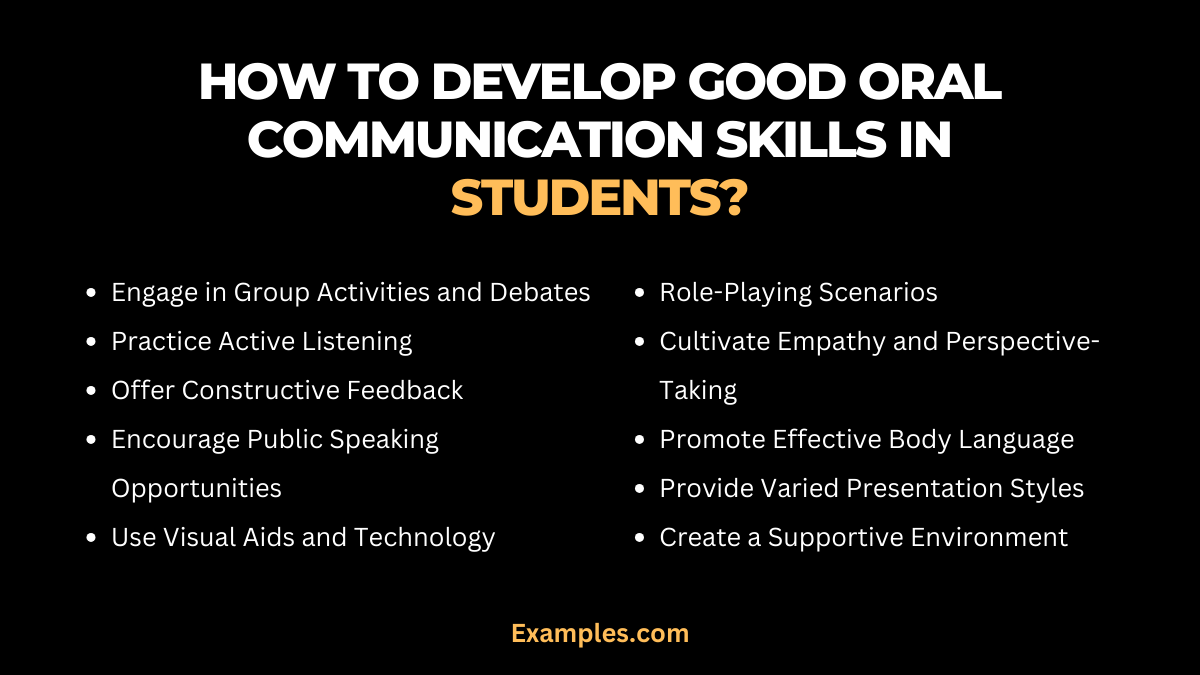
1. Engage in Group Activities and Debates: Encourage students to participate in group discussions, debates, and collaborative projects. This fosters confidence, hones articulation, and teaches the art of respectful communication.
2. Practice Active Listening: Emphasize the importance of attentive listening. Exercises involving active listening promote understanding, empathy, and the ability to respond effectively.
3. Offer Constructive Feedback: Create an environment where students feel comfortable providing and receiving constructive feedback. This cultivates self-awareness and improves communication strategies.
4. Encourage Public Speaking Opportunities: Provide platforms for public speaking, such as presentations or storytelling sessions. These opportunities build confidence and help students express themselves more effectively.
5. Use Visual Aids and Technology: Incorporate visual aids and technology into lessons. These tools engage students, enhancing their communication skills through diverse mediums.
6. Role-Playing Scenarios: Engage students in role-playing exercises to navigate real-life communication scenarios. This develops adaptability and problem-solving skills.
7. Cultivate Empathy and Perspective-Taking: Encourage students to consider diverse perspectives and practice empathy. Understanding different viewpoints improves communication and fosters inclusivity.
8. Promote Effective Body Language: Teach the significance of non-verbal cues like posture, gestures, and eye contact. This complements verbal communication, enhancing overall effectiveness.
9. Provide Varied Presentation Styles : Allow flexibility in presentation styles to accommodate individual strengths. This helps students find their preferred mode of communication.
10. Create a Supportive Environment: Finally, establish an inclusive, non-judgmental classroom environment where students feel encouraged to communicate freely and experiment with different communication styles.
What are the Characteristics of Good Oral Communication?
Good oral communication is characterized by several key attributes that contribute to its effectiveness.
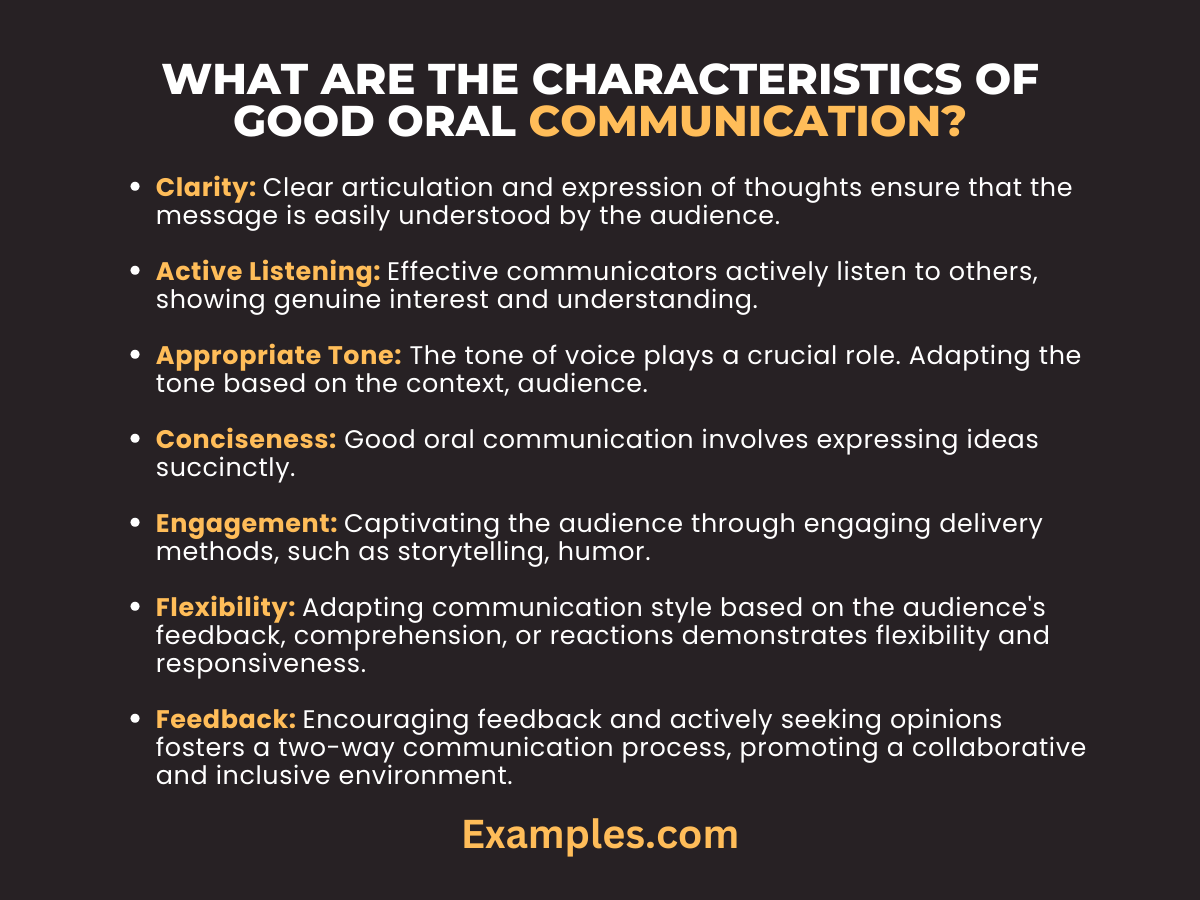
Clarity: Clear articulation and expression of thoughts ensure that the message is easily understood by the audience. Avoiding jargon and using straightforward language enhances clarity.
Active Listening: Effective communicators actively listen to others, showing genuine interest and understanding. This involves providing feedback, asking questions, and acknowledging the speaker’s perspective.
Appropriate Tone: The tone of voice plays a crucial role. Adapting the tone based on the context, audience, and message helps convey emotions and intentions accurately.
Conciseness: Good oral communication involves expressing ideas succinctly. Avoiding unnecessary details and focusing on the core message prevents listener confusion.
Engagement: Captivating the audience through engaging delivery methods, such as storytelling, humor, or relatable examples, enhances the overall impact of oral communication.
Flexibility: Adapting communication style based on the audience’s feedback, comprehension, or reactions demonstrates flexibility and responsiveness.
Feedback: Encouraging feedback and actively seeking opinions fosters a two-way communication process, promoting a collaborative and inclusive environment.
How to Improve Good Oral Communication in the Workplace?
Enhancing oral communication skills in the workplace is vital for effective collaboration and productivity.
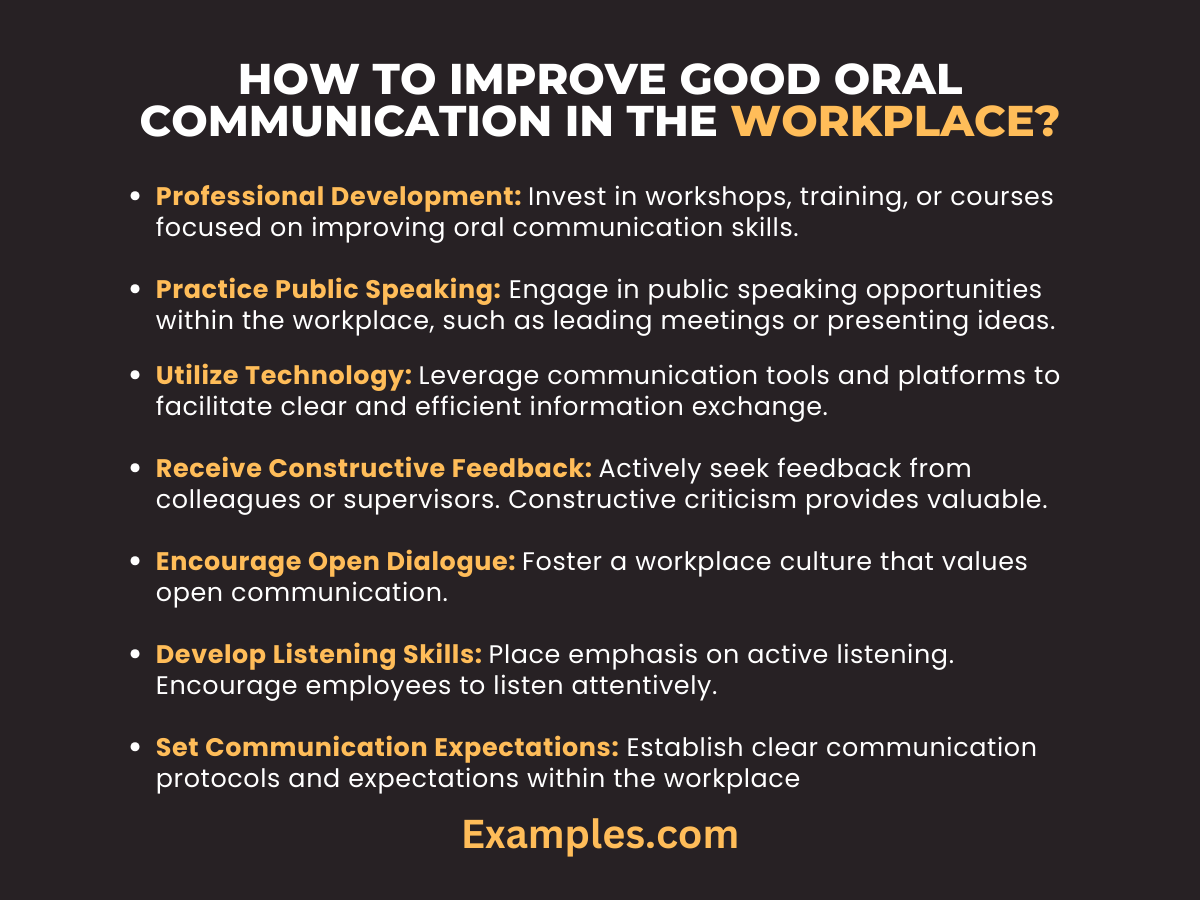
Professional Development: Invest in workshops, training, or courses focused on improving oral communication skills. These programs can provide valuable insights and practical tips.
Practice Public Speaking: Engage in public speaking opportunities within the workplace, such as leading meetings or presenting ideas. Regular practice helps build confidence and hones communication skills.
Utilize Technology: Leverage communication tools and platforms to facilitate clear and efficient information exchange. Virtual meetings, collaboration apps, and messaging platforms can streamline workplace communication.
Receive Constructive Feedback: Actively seek feedback from colleagues or supervisors. Constructive criticism provides valuable insights for improvement and helps identify areas that may require attention.
Encourage Open Dialogue: Foster a workplace culture that values open communication. Encourage team members to express their thoughts, ideas, and concerns freely, creating an environment conducive to effective oral communication.
Develop Listening Skills: Place emphasis on active listening. Encourage employees to listen attentively, ask clarifying questions, and demonstrate understanding during conversations.
Set Communication Expectations: Establish clear communication protocols and expectations within the workplace. This includes preferred channels, response times, and guidelines for professional and respectful communication.
In conclusion, In the dynamic world of communication, mastering the art of oral communication is not just an asset but a necessity. Whether it’s in a professional setting, educational environment, or personal interactions, the ability to communicate effectively shapes our experiences and outcomes. As we have explored, good oral communication hinges on clarity, active listening, appropriate tone, and the ability to engage the audience. It’s about conveying your message with precision and empathy, ensuring that it resonates with your listeners.
To further enhance your oral communication skills, consider exploring resources from reputable educational institutions. For instance, Harvard University’s Professional Development programs offer a range of courses and workshops focused on improving communication skills. These programs, designed by leading experts, provide practical strategies and insights that can be applied in various aspects of life. Similarly, the Toastmasters International organization provides a supportive learning environment where individuals can practice public speaking and leadership skills, helping them to become more effective communicators.
In conclusion, good oral communication is not just about speaking well; it’s about connecting with others, understanding their perspectives, and creating a meaningful dialogue. By continuously refining these skills and seeking opportunities for growth, we can navigate our personal and professional lives with greater confidence and effectiveness. Remember, every conversation is an opportunity to learn, inspire, and make a lasting impact.



